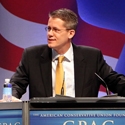You have /5 articles left.
Sign up for a free account or log in.

Mike Adams
U. of North Carolina at Wilmington
Seven years after Mike Adams sued the University of North Carolina at Wilmington, charging that he was denied a promotion because of his political views, a federal jury agreed on Thursday.
The verdict comes in a case that has attracted considerable attention because Adams has a large conservative following, and his case represents the kind of bias many on the right say they experience in academe (typically without a verdict like this one). Also, some of the earlier rulings in the case raised issues of academic freedom that went far beyond Adams and his writings -- and that concerned academics across the political spectrum.
Adams sued in 2007 after being denied a promotion to full professor of sociology. He cited emails and statements from faculty colleagues taking issue with his views, which are outspoken and conservative. (You can find a selection of his columns here.) The Adams case was of particular interest to many who charge political bias in the academy because he is a political (and religious) convert. He presented evidence that his faculty colleagues liked him when he was an atheist Democrat, but started to have concerns when he became a Christian Republican.
The university maintained that it had legitimate, non-political reasons for denying his promotion, suggesting that he had not done enough research. But he presented evidence that he had published more than the number of peer-reviewed articles generally considered to make one "safe" for promotion to full professor at Wilmington.
The jury backed Adams through a two-part finding (that took two hours of deliberation). The jury found that his writing played a "substantial" part in the decision to deny him a promotion. And the jury found that the university would not have made the same decision absent those writings.
Next week, lawyers for Adams will file a proposed remedy with the court, and they declined on Thursday to say what they would seek. In a column published this week, Adams said that, if he won in court, he would seek to create a center for protecting the rights of students who feel discriminated against because of their political or religious views, and that he would seek to create a line-item veto for the state higher education budget.
He wrote that "such legislation must force universities to submit separate academic and non-academic spending budgets. Funding requests for the physics department should not be entangled with funding for the Gay and Lesbian Resource Centers."
Travis Barham, a lawyer with the Alliance Defense Fund who represented Adams, said that "this is a resounding victory for free speech and academic freedom. This is what he has been saying for seven years."
The university released a statement that said in part: "The university respectfully disagrees with the jury¹s verdict and will fully explore its options for appeal with the N.C. attorney general's office. UNCW has been, and will continue to be, supportive of its faculty members' rights under the First Amendment. UNCW strongly believes that its faculty properly applied their academic judgment in determining that Dr. Adams' application did not merit promotion to full professor in 2006 and firmly denies that Dr. Adams' political or religious viewpoints played any role whatsoever in the decision."
Free Speech Issues
Adams attracted support from organizations such as the American Association of University Professors (groups that disagree with many of his positions) during an appeal of a 2010 ruling in the case. In the 2010 ruling, a federal judge found that the columns by Adams lacked First Amendment protection because he had submitted them in the dossier for his internal evaluations at the university as evidence of his writing and public role.
The judge cited a controversial 2006 Supreme Court ruling, Garcetti v. Ceballos was in which the Supreme Court found that First Amendment protections do not extend to public employees when they speak in capacities related to their jobs. Applying Garcetti in this way, many advocates for academic freedom feared, could endanger the rights of any professors who speak out on controversial topics. They have argued that the decision, which involved the Los Angeles district attorney's office, was never intended to apply to higher education.
In 2011, a federal appeals court reversed the 2010 ruling and said that Garcetti should not be applied to the Adams case and that his columns did have First Amendment protection. And it was that ruling that set the stage for this week's trial and verdict in the case.




